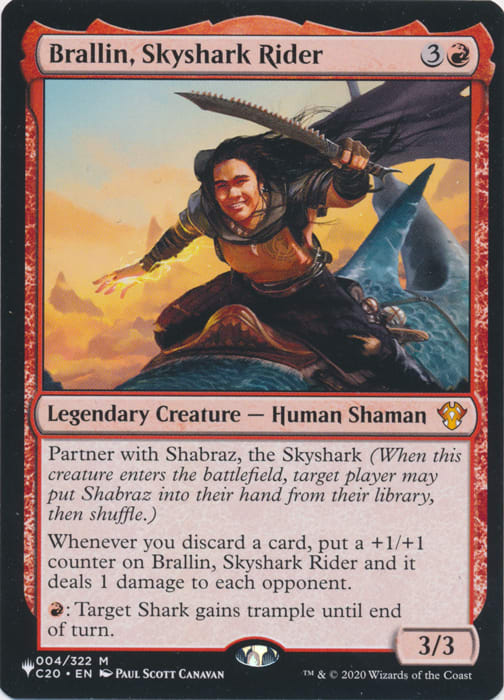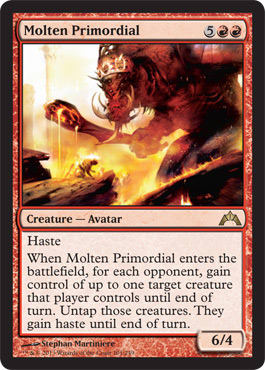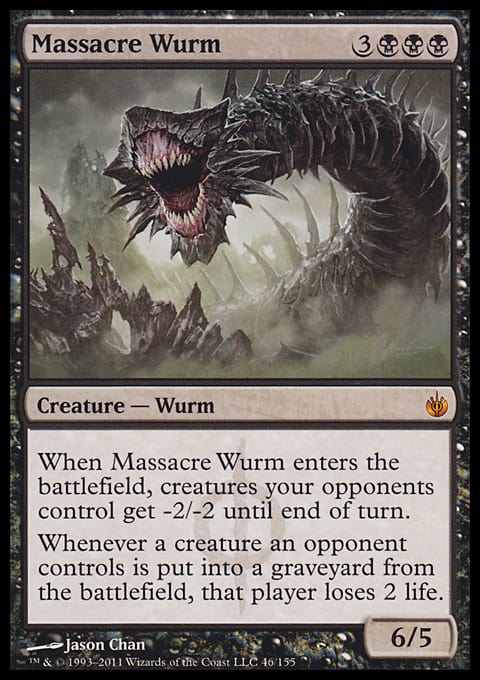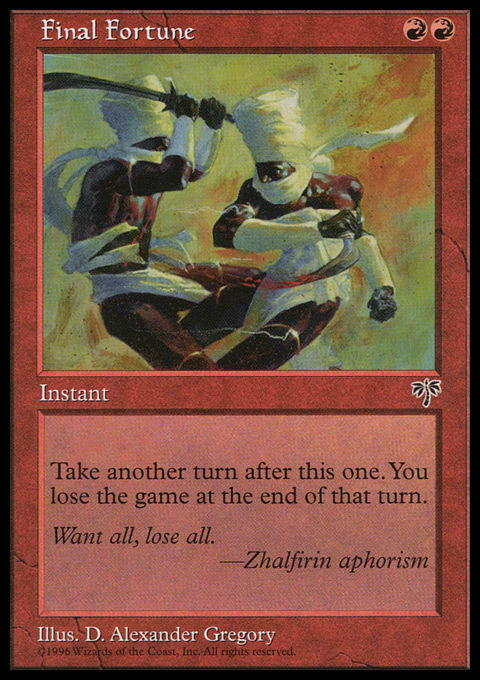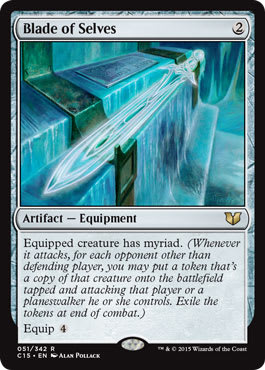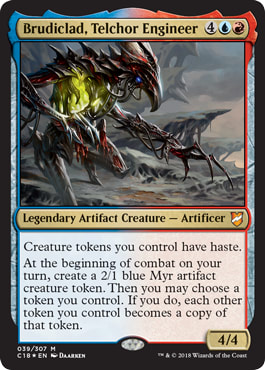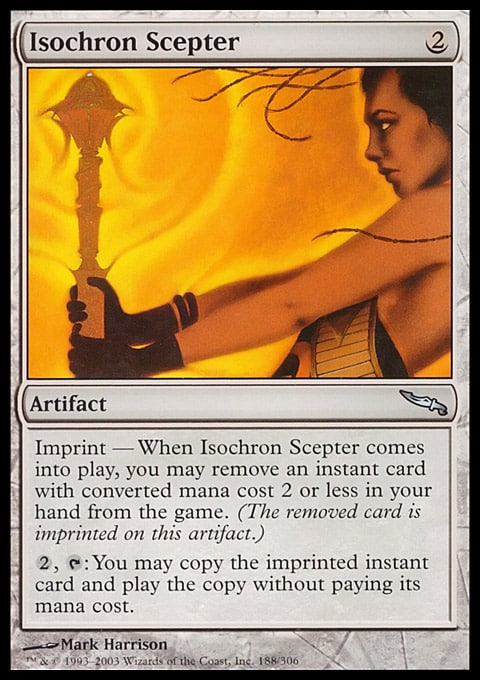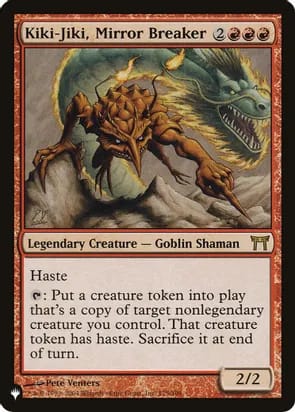Commander Legends was truly the gift that keeps on giving. With Time Spiral Remastered being made up of reprints, my fellow writers and I are continuing to look back at some of the legendary creatures from Commander Legends that we didn't cover last Fall.
I'm a fan of commanders that present you with a puzzle or a unique challenge to try to solve. When I realized that none of the other writers had done a deep dive on Obeka, Brute Chronologist, I knew I had to grab her.
This punky Ogre Wizard has a really interesting party trick. She can tap and the player whose turn it is may end the turn. Obeka's ability is unique and demands two things of us.
First, we must remember that it's a "may" ability. If someone is about to win the game, you can still tap Obeka, but the person currently taking their turn is under no obligation to stop whatever it is they are doing. If you compare her to Sundial of the Infinite , you'll notice that Sundial can only be used during your turn, and it costs a single mana to activate.
There's an argument that keeping Obeka untapped and ready to activate could be really useful if you play with people who like to win on other players' turns. I think in the grand scheme of things that's not a very strong argument. We need to remember that we'll only be able to reliably use her ability on our own turn. Ending the turn is still a powerful ability, but how do we abuse it?
The second thing Obeka demands of us is that we pay really close attention to what we're doing when we build this deck. Jason Alt warned me that Obeka's page on EDHRec.com is littered with cards that don't actually synergize with Obeka. I don't generally use EDHRec.com when I write, not because it's a bad resource but because I want to come up with my own ideas. Still, his warning is a good one, so before I dig into building this deck I think it's worth taking a look at exactly what kind of issues deckbuilders are running into.
Obeka's Rulings
When building around any commander with an interesting or odd ability, it's worth taking a moment to look at the commander's oracle text and any rulings that have been posted on Gatherer.
As with most modern cards, her text box matches her oracle text. A card's official text is their "oracle text" and is always listed on Gatherer. If there is any difference between the oracle text and the text printed on the card, you always follow the oracle text. That might seem weird, but lots of old cards have been changed over the years in small and occasional even significant ways.
The first Obeka ruling explains what is involved when a turn is ended using Obeka's ability. To sum up, the stack is cleared, any attackers or blockers are removed from combat, state-based actions are checked but no player gains priority and no triggered abilities can be put on the stack. The current phase or step ends and the game jumps to the turn's cleanup step. If any triggered abilities are put on the stack at this point, priority is passed and once the stack is empty you go to cleanup again until you successfully get through the cleanup step. Then, and only then, is turn over.
If a turn ends before the normal end step, you will find yourself skipping to the cleanup step. This means that any "At the beginning of the next end step" triggered abilities won't get the chance to trigger that turn. Those abilities will trigger on the following turn at the beginning of that turn's end step. If you somehow found yourself in a game full of Obeka decks and you skipped 10 end steps in a row, that 11th turn would still see those triggered abilities happen.
The trick with Obeka is simple, but you have to understand how "the stack" works.
Spells and abilities are put into a queue called the stack. They are resolved in a "last in, first out" order. If you cast Craterhoof Behemoth and someone plays a Counterspell and a third player cuts a deal with you to not attack them and plays a Swan Song to counter the Counterspell, the Swan Song is the first spell to resolve. It counters the Counterspell and then the Craterhoof would resolve.
Last in, first out.
The secret to Understanding Obeka is to understand that you have to build around cards with "at the beginning" abilities. You simply wait until the trigger is put on the stack. These are "delayed" triggers because they will be put on the stack only when the card specifies that they are supposed to happen. In Obeka's case you should be playing cards with triggers that happen at the beginning of the next end step. You hold priority and respond by activating Obeka, which results in all spells and abilities that are on the stack being exiled. You satisfied the requirement that the delayed trigger be put on the stack so it won't happen again.
You also kept the delayed trigger from resolving by using Obeka to clear the stack.
It's worth noting that other delayed triggers can also be avoided with Obeka's ability. If you had an "at the end of combat" trigger you could also end the turn as soon as that trigger was put on the stack. Just make sure all your delayed triggers on a given turn will occur at the same time. Mixing "at the end of combat" and "at the beginning of the next end step" won't work well for you.
So why are people having trouble building around Obeka? What types of cards are they including that they should be leaving out of their Obeka lists?
Until End of Turn
Any ability that lasts until end of turn doesn't care about the beginning of the end step.
Those abilities care about the cleanup step, which you cannot skip with Obeka, or with anything other card that I'm aware of.
A classic example of this is a spell or ability that grants an ability until end of turn.
Brallin, Skyshark Rider has an activated ability that will give target Shark trample until end of turn. If you try to end the turn early, you won't be giving your pet Shark trample for the rest of the game. That "end of turn" cares about the cleanup step and we won't be skipping that. You'll have your Trampleshark, but not for any longer than normal - not even for a single extra turn.
Molten Primordial is another great example. It can steal creatures from your opponents until end of turn. If you end the turn early, you don't keep them forever. You don't even get to keep them an extra turn because you still hit that pesky cleanup step and that's when you have to give them back. If we could do permanently give our opponents' creatures - 2/-2 with an "until end of turn" creature like Massacre Wurm, Obeka would be a much more powerful commander, but it just doesn't work that way.
Consult the Oracle
Because this is a really key point and will make the difference between using Obeka correctly or not, we really have to pay attention to a card's oracle text. It should be rare that there will be a discrepancy that matters, but always check just to be sure.
Final Fortune looks like it would be great with Obeka. Then you see that it reads "You lose the game at the end of that turn" and according to what I've been saying, you would assume that it would not work well with Obeka because you can't skip that cleanup step. This is where the oracle text comes in. The oracle text reads "At the beginning of that turn's end step, you lose the game." That means you can indeed put that delayed trigger on the stack and then activate Obeka. You can even imprint it on an Isochron Scepter and take infinite turns! It's no wonder that old rare went from under $2 to well over $20 in the last year.
Dragon Whelp is another great example, and is more interesting than Final Fortune.

Fourth Edition

Magic 2010

Commander Anthologies
The original card can pay mana to give Dragon Whelp +1/+0 until end of turn. If you spend more than three in this way during one turn, the old card reads "destroy Dragon Whelp at end of turn." This older text is on the Alpha, Beta, Unlimited, Revised and Fourth Edition printings of Dragon Whelp. In Magic 2010 and in every printing after that, the card was updated to read "At end of turn, if this ability has been activated four or more times this turn, sacrifice Dragon Whelp." That "activated" was changed to "played" in Time Spiral for some reason.
But none of that matters much. What matters is what the oracle text says, and you can find that on Gatherer. It can change, and this article likely wouldn't get updated if Dragon Whelp's oracle text did get changed for some reason.
If you can you pour 10 mana into Dragon Whelp to make it huge and then you put the "at the beginning of the next end step" trigger on the stack and use Obeka to end the turn, do you keep your pumped up Dragon Whelp instead of sacrificing it?
Well... yes and no.
Yes, you CAN clear the stack of that trigger that would otherwise force you to sacrifice your Dragon Whelp.
The "firebreathing" ability happens to be an "until end of turn" ability, not an "at the beginning of the next end step" ability. That means that you can dodge the requirement that you sacrifice your Dragon Whelp, but any increase in power that you gave it by activating Dragon Whelp's ability will go away in the cleanup step whether you used Obeka or not. You'll keep your big Dragon, but he won't stay big.
All the Right Triggers
We know we have to build around delayed triggers, but if we want to squeeze some advantage out of Obeka, we don't just want to load up on cards with end step triggers.
Let's look at some of the keywords that represent abilities that naturally synergize with Obeka. There are plenty of them and looking for friendly keywords will definitely make it easier to put this list together.
Unearth will allow me to put a creature into play from the graveyard. It will gain haste and it gets exiled at the beginning of the next end step or if it would leave the battlefield. Sedris, the Traitor King will give the creatures in my graveyard unearth, but there are also lots of creatures that have unearth on their own.
Encore will let me exile a creature from the graveyard and for each opponent I create a token copy of that creature with haste that attacks that opponent if able. They have to be sacrificed at the beginning of the next end step, and since they're token copies they will be gone if they leave the battlefield. Araumi of the Dead Tide will let me give encore to a creature in my graveyard at the cost of tapping Araumi and exiling a few other cards from the graveyard. I'll also run a few creatures that naturally have encore.
If I'm willing to use Obeka earlier than the end step, there are a few other ways to squeeze value out of her ability. Blade of Selves will give a creature equipped with it the myriad. When it attacks I'll create token copies of it, each attacking a different opponent other than the one the equipped creature is attacking. Those token copies get exiled at the end of combat.
Any creature with the evoke keyword gets put into the graveyard immediately if I cast it for its evoke cost. You can use a spell or ability to flicker it in response to that trigger to keep it permanently, but if you use Obeka's ability to end the turn in response to that trigger going on the stack, you'll also keep it. Using Obeka to keep creatures that you cast for their evoke costs seems like a pretty small benefit, but it is something you can do with her.
My Secret Commander
While throwing this list together, it struck me that Obeka, Brute Chronologist doesn't lend herself to any obvious strategy. Beyond the infinite turn combos (which I'll get to in a bit), the biggest thing I can see doing is using Obeka to keep token creatures that would otherwise have to be sacrificed at the beginning of the next end step.
A lot of the major Obeka tricks seem to involve token creatures. When faced with building a deck that seems to have a theme I didn't expect, I start to look for ways to make the most of that theme. In this case I'm going to try to find a way to take advantage of all those tokens.
If I've managed to get to the late game, I've built a deck where there's a reasonable chance that I'll have a small assortment of interesting token creatures. I might have used Obeka after using Trove Tracker's encore ability so I have a few 2/2 tokens lying around. I might have gone a few turns with a Rite of the Raging Storm on the field so I'm sitting on a small pile of 5/1 Elemental creature tokens named Lightning Rager. I could have a handful of Treasures from Dockside Extortionist or Revel in Riches. I might even have some token copies of a creature that naturally has myriad.
Whatever I've got going on, if I can get Brudiclad, Telchor Engineer onto the battlefield all of my tokens can become copies of the best of my tokens. If I can turn those tokens into a copy of a Banshee of the Dread Choir, Broodbirth Viper or Warchief Giant, things will get nutty. If I take 10 creatures and make them copies of a token with myriad and then attack someone, each of those creatures will now create a token copy of themselves for each other opponent the original copy wasn't attacking.
All those new token copies I just made will still need to be exiled at the end of combat... but they can also be kept by using Obeka's nifty ability! This might be magical Christmasland, but isn't that why we build decks and play this format in the first place?
The Decklist
I have built very few Grixis decks over the years, so if there are obvious issues with my list, please let me know. I wound up leaning towards artifacts and a robust land count for my manabase. I've thrown in a few staples, but there should be plenty of excuses to tap Obeka. I suspect I'd have to play this list a bit to really get a sense of how I need to tweak it.
Obeka Tokens | Commander | Stephen Johnson
- Commander (1)
- 1 Obeka, Brute Chronologist
- Creatures (30)
- 1 Anathemancer
- 1 Amphin Mutineer
- 1 Araumi of the Dead Tide
- 1 Brudiclad, Telchor Engineer
- 1 Briarblade Adept
- 1 Banshee of the Dread Choir
- 1 Broodbirth Viper
- 1 Corpse Connoisseur
- 1 Coastline Marauders
- 1 Dockside Extortionist
- 1 Dreamscape Artist
- 1 Extractor Demon
- 1 Fatestitcher
- 1 Feldon of the Third Path
- 1 First-Sphere Gargantua
- 1 Grixis Slavedriver
- 1 Hellkite Courser
- 1 Impulsive Pilferer
- 1 Identity Thief
- 1 Kitesail Skirmisher
- 1 Mulldrifter
- 1 Night Incarnate
- 1 Pitiless Plunderer
- 1 Rakshasa Debaser
- 1 Sedraxis Specter
- 1 Sedris, the Traitor King
- 1 Sidisi, Undead Vizier
- 1 Trove Tracker
- 1 Viscera Dragger
- 1 Warchief Giant
- Instants (11)
- 1 Aetherspouts
- 1 Cauldron Dance
- 1 Counterspell
- 1 Cyclonic Rift
- 1 Deflecting Swat
- 1 Fierce Guardianship
- 1 Flusterstorm
- 1 Pongify
- 1 Rapid Hybridization
- 1 Swan Song
- 1 Vampiric Tutor
- Sorceries (7)
- 1 Damnation
- 1 Demonic Tutor
- 1 Firecat Blitz
- 1 Ideas Unbound
- 1 Reforge the Soul
- 1 Toxic Deluge
- 1 Windfall
- Enchantments (4)
- 1 Elemental Mastery
- 1 Revel in Riches
- 1 Rhystic Study
- 1 Rite of the Raging Storm
- Artifacts (10)
- 1 Arcane Signet
- 1 Ashnod's Altar
- 1 Blade of Selves
- 1 Chromatic Lantern
- 1 Dimir Signet
- 1 Izzet Signet
- 1 Mimic Vat
- 1 Phyrexian Altar
- 1 Rakdos Signet
- 1 Sol Ring
I did not include Ilharg, the Raze-Boar or Purphoros, Bronze-Blooded. Those two legendary creatures let you cheat a creature into play tapped and attacking, but don't play into my tokens theme. I'd want to be playing with Eldrazi Titans and creatures like Blightsteel Colossus if I'm playing Ilharg or the Purphoros from Theros Beyond Death. I'm not, so while these two creatures are powerful and have that "at the beginning of the next end step" delayed trigger, they didn't make the cut in today's list.
Tuning Up Obeka
If you were going to try to tune this up for higher powered tables, I think you pretty much have to jump on the infinite turns train. That means reworking the deck to focus on what might be the single most powerful thing Obeka can do.
Taking infinite turns might not automatically win the game, but most tables will scoop if you're able to show them that nobody else will get another turn. With a gameplan like that, you'll want to add more interaction. You're in the right colors to be able to run the usual Thassa's Oracle wincon so Tainted Pact and Demonic Consultation make sense.
Kiki-Jiki, Mirror Breaker happens to have that key phrase "at the beginning of the next end step" on it. Kiki-Jiki is a high-powered card that can combo with a bunch of enablers, but I don't think it belongs in an Obeka list, even a high-powered one. Obeka is a three-color deck and Kiki-Jiki requires three mana of a single color. Kiki combo generally just wins the game immediately, so there's no real need to end the turn once you've put those delayed sacrifice triggers on the stack. I could see building a heavy-Red Obeka Kiki-Jiki combo deck as an experiment. You've got access to Blue for countermagic and Black for tutors, but the strongest Kiki-Jiki, Mirror Breaker deck will likely have him in the command zone, not in the 99.
Is a tune-up where you start playing with infinite turns a slippery slope when you're in Grixis that will eventually lead to Thassa's Oracle? Possibly, but it doesn't have to end up being nearly the same as every other cEDH deck unless that's where you want to go with it.
Final Thoughts
When I started working on this list, I had no idea where it would go. I assumed I'd end up with an infinite turns Obeka deck. You could still have that with just a few card changes, but I'm really happy with what I wound up with.
The idea of making an assortment of tokens, getting Brudiclad out, turning all of them into token copies of something like Banshee of the Dread Choir, and then getting an army of them would be pretty cool. Every turn your army will keep growing unless you're down to one opponent. Then the myriad keyword isn't very helpful. In fact, it does nothing at all.
If you found my deep dive on the way Obeka works or the importance of reading rulings and consulting oracle text, please let me know. I'm not a judge and I don't usually dig into the rules quite this deeply.
That's all I've got for today. Thanks for reading and I'll see you back here soon!



















